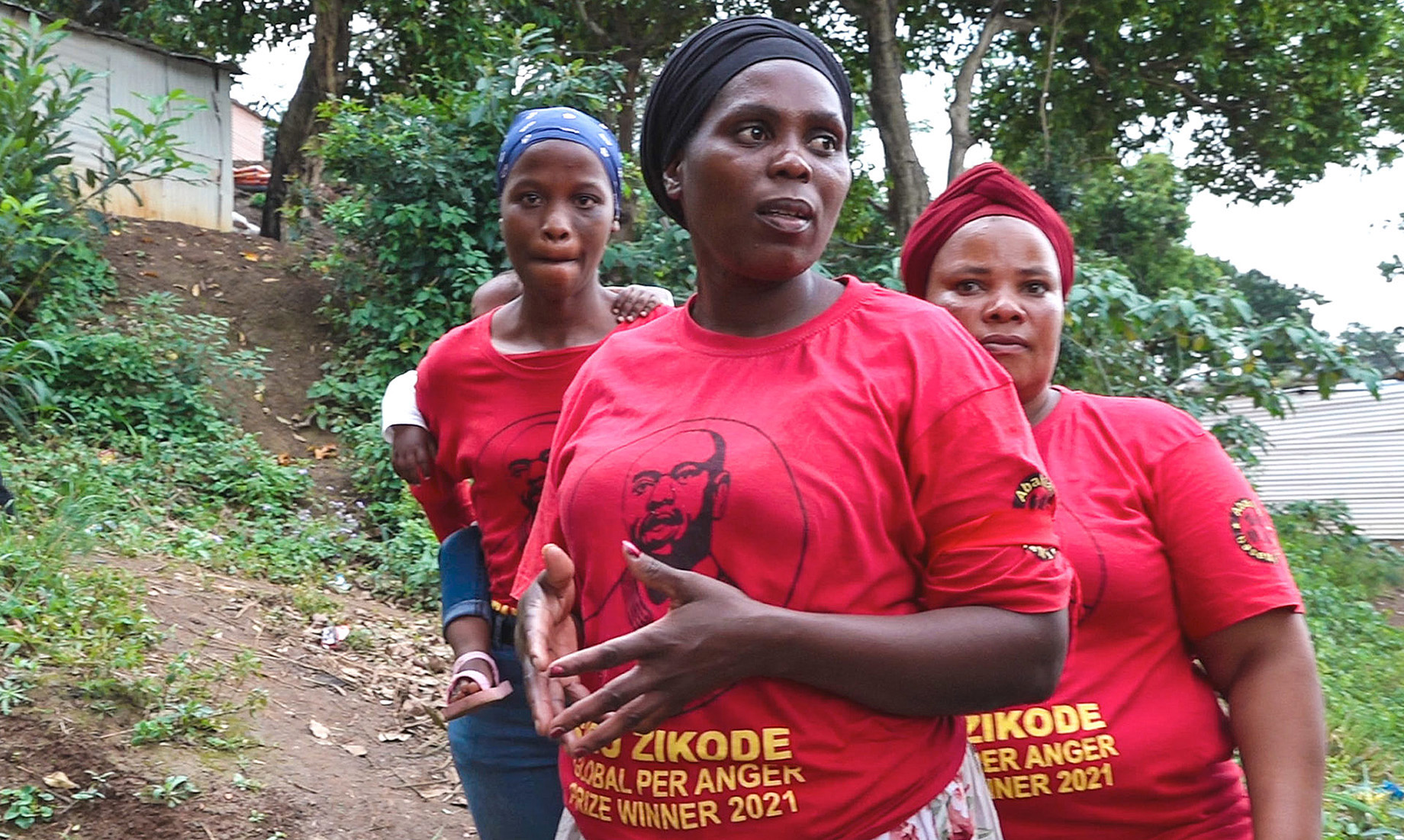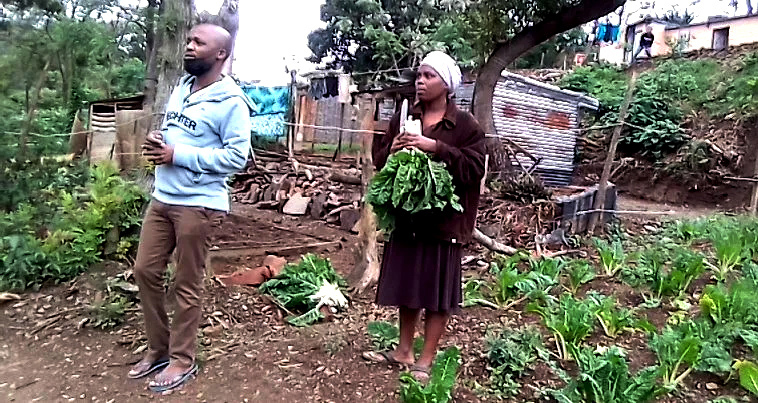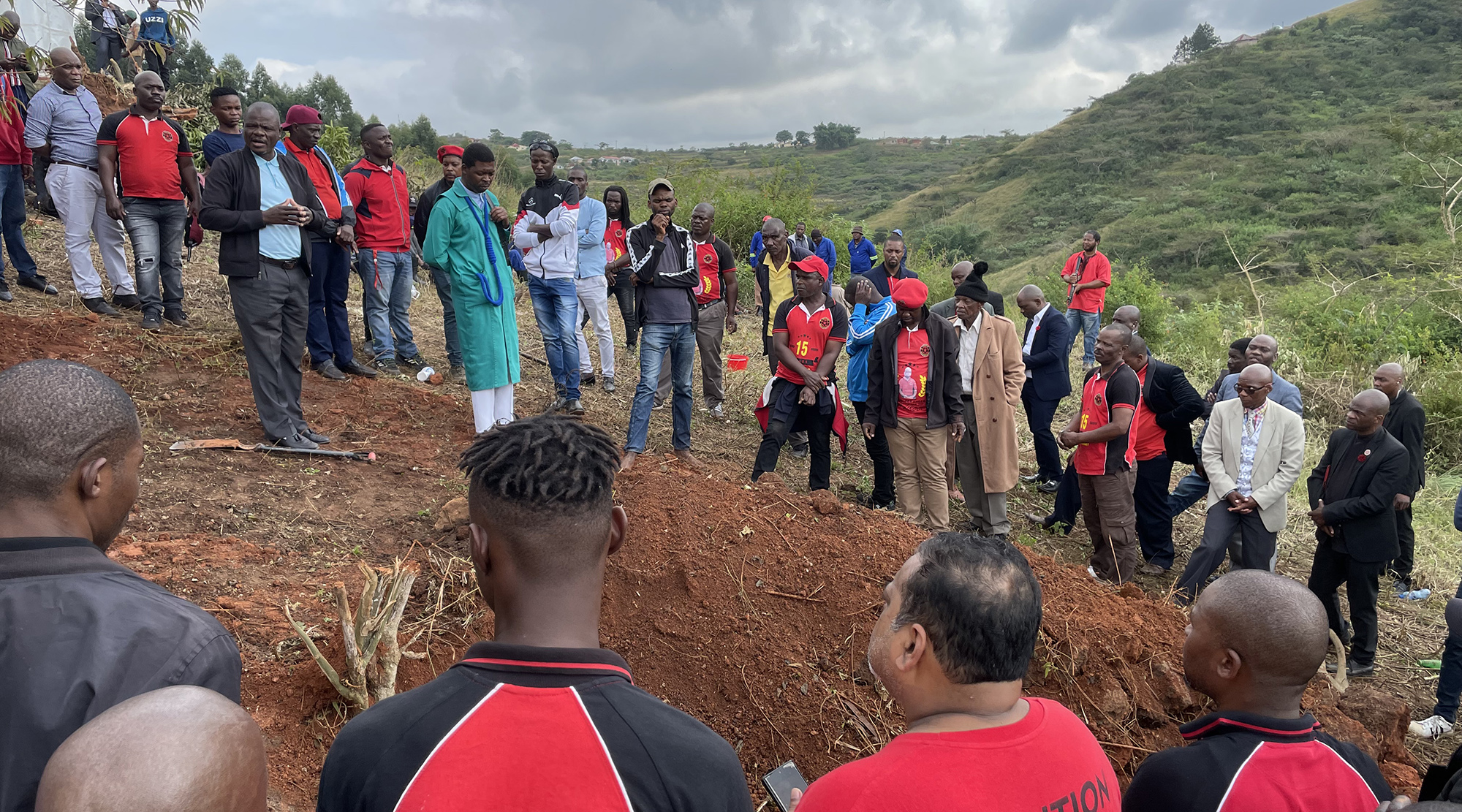On 5 May 2022, Nokuthula Mabaso from the eKhenana informal settlement in eThekwini was shot and killed in front of her children while tending to a pot of rice. Two months before this, on 8 March 2022, she had witnessed the murder of another community member, Ayanda Ngila, and was due to submit an affidavit of what she witnessed.
Just three months later, on 20 August 2022, a third resident, Lindokuhle Mnguni, was shot in his home while sleeping next to his partner. Also a target the day Ayanda was killed, Lindokuhle had been in hiding leading up to his killing, but the night he was killed was the first night he had slept at home again.
 Abahlali base Mjindolo leader Nokuthula Mabaso (standing in the middle) was shot dead on 5 May 2022. (Photo: Nomfundo Xolo)
Abahlali base Mjindolo leader Nokuthula Mabaso (standing in the middle) was shot dead on 5 May 2022. (Photo: Nomfundo Xolo)
 This image shows Nokuthula Mabaso giving Ayanda Ngila spinach from the communal garden at eKhenana for him to cook at the place of hiding after he and three others were released from prison where they had been held for six months before bogus murder charges brought against them were finally withdrawn. Ayanda was assassinated on 8 March 2022. Nokuthula was assassinated on 5 May 2022. (Photo: Abahlali Facebook)
This image shows Nokuthula Mabaso giving Ayanda Ngila spinach from the communal garden at eKhenana for him to cook at the place of hiding after he and three others were released from prison where they had been held for six months before bogus murder charges brought against them were finally withdrawn. Ayanda was assassinated on 8 March 2022. Nokuthula was assassinated on 5 May 2022. (Photo: Abahlali Facebook)
Nokuthula, Ayanda and Lindokuhle are not just numbers, they are mothers, fathers, partners, brothers and sisters, whose lives appear to have no value to authorities. In South Africa today, the value of your life still depends on your status in society.
All three were members of Abahlali baseMjondolo (Abahlali) a grassroots movement of more than 150,000 members across the country living in informal settlements fighting for land, housing and dignity.
These threats, attacks and killings, however, did not only start in 2022. From its inception in 2005, Abahlali has faced resistance from individuals who are challenged by its activism. Members and leaders of the movement have faced threats, attacks, unlawful evictions, trumped-up legal charges, harassment, attempted murders and killings in response to their activism over the past 18 years.
These attacks have been well documented by journalists, civil society organisations and the movement itself. Since 2009, Abahlali has counted 25 members who have been killed, many as a direct result of their activism. Yet, there have only been two convictions for these killings – that of Thuli Ndlovu and Ayanda Ngila in 2014. There has been no justice for the other 23.
Abahlali members are not alone. Human rights defenders in South Africa face a range of challenges to their work, including threats, intimidation, killings, unjust prosecution and cyberbullying from both state and non-state actors. Attacks, intimidation and killing of human rights defenders, which are likely to have been under-reported due to fear of reprisals, are consistently met with little to no accountability.
 Members of the Amadiba Crisis Committee hold a meeting at the exact site where a bridge for Sanral’s N2 Toll Road is planned through the Wild Coast. (Photo: Daniel Steyn)
Members of the Amadiba Crisis Committee hold a meeting at the exact site where a bridge for Sanral’s N2 Toll Road is planned through the Wild Coast. (Photo: Daniel Steyn)
The past several years have also seen the 2016 killing of Sikhosiphi “Bazooka” Rhadebe, a land and environmental rights defender and former chairperson of the Amadiba Crisis Committee, which is opposing open cast mining in its communities, as well as the repeated and continued threats against another Amadiba Crisis Committee leader, Nonhle Mbuthuma, who is tirelessly standing up for her community.
 Murdered human rights defenders, from left: Fikile Ntshangase was killed for speaking out against the expansion of mining operations in her community. (Photo: Supplied) | Sikhosiphi ‘Bazooka’ Rhadebe, a land and environmental rights defender and former chairperson of the Amadiba Crisis Committee. (Photo: Supplied)
Murdered human rights defenders, from left: Fikile Ntshangase was killed for speaking out against the expansion of mining operations in her community. (Photo: Supplied) | Sikhosiphi ‘Bazooka’ Rhadebe, a land and environmental rights defender and former chairperson of the Amadiba Crisis Committee. (Photo: Supplied)
In October 2020, Fikile Ntshangase was killed for speaking out against the expansion of mining operations in her community. There has been neither protection nor justice for them or their families.
Shockingly, when these defenders turn to the authorities for protection from imminent danger, all too often, their pleas are met with indifference. The tragic truth is that authorities fail to safeguard human rights defenders from threats, leaving them vulnerable to violence without recourse to justice.
Amnesty International report
This week, Amnesty International South Africa published a research report, titled Our Lives Count For Nothing: Threats, attacks, and killings of members of Abahlali baseMjondolo (shack dwellers) movement in South Africa’s KwaZulu-Natal province, looking at the killings and pattern of threats and attacks against Abahlali members in eKhenana, and the state’s failure to adequately respond to it.
A common theme emerged when Amnesty International conducted interviews with Abahlali human rights defenders – the authorities have failed and continue to fail to protect human rights defenders. Police often do not respond or take measures to protect those receiving threats, despite these being reported to them.
Ayanda, Nokuthula and Lindokuhle all apparently received threats ahead of their killings, yet nothing was done to assist them. There are still leaders in the movement receiving threats, with police refusing to open cases or provide them with much-needed protection.
Allegations were made of police failing to collect evidence, to conduct thorough and efficient investigations, and to make arrests. To reiterate, of the 25 people Abahlali has counted as having been killed over 18 years, there have only been two convictions.
Because of all of this, there is a general lack of trust in the police. Abahlali has been let down countless times, slowly eroding trust over many years.
While some police officers do and have supported the movement, the overall lack of trust means that many of these human rights defenders no longer report or open cases with the police.
Our report delves deeper into state failures and highlights the plight faced by Abahlali members.
As part of Amnesty International’s research process, relevant authorities such as the South African Police Service, the police minister and the National Prosecuting Authority, to name a few, were given an opportunity to respond to any allegations made. However, by the time we finalised and launched the report none had responded.
The ultimate responsibility to prevent and address the threats and attacks against human rights defenders lies with the state. The authorities have an obligation to monitor, investigate and hold those responsible accountable.
Not only must the state react swiftly and effectively to these instances, it must also proactively create a safe and enabling environment for human rights defenders to carry out their important work.
Abahlali is a critical movement, highlighting serious issues that millions of people in South Africa are faced with daily and enacting positive and sustainable change by setting up communal vegetable gardens, communal kitchens and crèches, to name a few, in their communities. Their leaders and members should not be met with violence and fear for their lives simply for standing up for human rights.
It is time for the South African government to publicly acknowledge the enormous risks and challenges faced by human rights defenders like Abahlali, recognise their work for the advancement of human rights, conduct effective investigations into the threats and attacks, hold the perpetrators accountable, and provide adequate protection for those at risk through the development of HRD protection legislation.
When the state fails to protect human rights defenders, it undermines the very fabric of justice and the hard-fought-for freedoms in South Africa. Like those who fought against the repressive apartheid government, these defenders courageously advocate for the rights and freedoms of others, risking their own safety and wellbeing in doing so.
When the state and law enforcement neglect to safeguard human rights defenders, it sends a chilling message that those who stand up for justice must do so at their own peril.
This failure not only threatens individual defenders, but also erodes trust in the institutions meant to uphold justice and equality for all. It is essential for authorities to uphold their duty to protect these defenders and ensure that their rights are respected, for a society to truly uphold the principles of human rights and justice.
It is time for impunity to end, and we need everyone, no matter who you are or whether you are directly affected by what is happening to human rights defenders, to stand up and demand justice for Abahlali and all human rights defenders. DM
Shenilla Mohamed is the executive director of Amnesty International South Africa.




 Murdered human rights defenders, from left: Fikile Ntshangase was killed for speaking out against the expansion of mining operations in her community. (Photo: Supplied) | Sikhosiphi ‘Bazooka’ Rhadebe, a land and environmental rights defender and former chairperson of the Amadiba Crisis Committee. (Photo: Supplied)
Murdered human rights defenders, from left: Fikile Ntshangase was killed for speaking out against the expansion of mining operations in her community. (Photo: Supplied) | Sikhosiphi ‘Bazooka’ Rhadebe, a land and environmental rights defender and former chairperson of the Amadiba Crisis Committee. (Photo: Supplied)